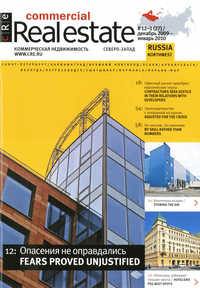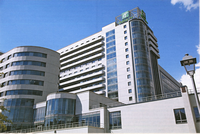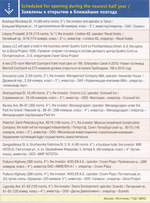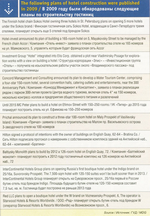Hoteliers Peg Best Spots

St. Petersburg owes the scope of hotel construction to the municipal program of creating hotel infrastructure. The crisis corrected the plans of the city government. When this program was adopted in 2007 the authorities were planning to increase the accommodation stock to 34,000 rooms by 2010, but now they are talking about 32,000 operational rooms by 2011. Nevertheless the hotel segment looks better than others, for this is the only industry where developers still announce new projects, even if with delivery dates beyond 2011.

As reported by Aleksey Chichkanov, Chairman of the Committee for Investments and Strategic Projects, the city currently has about 580 hotels with more than 26,000 rooms. "In the previous record-breaking year 1,250 new rooms were delivered to the market - more than in any other year since the pre-Olympic 1979, when Pribaltiyskaya and Pulkovskaya hotels were commissioned. In 2009 we may repeat last year`s results: 1,126 rooms are all ready and till the year`s end we expect the inauguration of the 174-room Reval Hotel on 5, Liteyny Prospekt. Overall 24 hotels have opened their doors in 2009, in addition to apartments and extra rooms in the already functional hotels. This number includes more than 10 mini hotels in different neighborhoods," reports the optimistically minded head of the Committee. Without mini hotels 66 quality hotels ranging from 3* to 5* functioned in the city with the total accommodation stock of 13,736 rooms. The 3-star 557-room congress hotel Holiday Inn St. Petersburg-Moskovskye Vorota and the second phase ofCorinthiaNevsky Palace (107 new suites and a congress venue) are the biggest projects completed in 2009. In the words of Irina Solonova, Director of Consulting Department GVA Sawyer SPb, 4-star hotels prevail in the quality accommodation stock (49%) followed by 3-star hotels (38%) and 5-star hotels (13%). In order to approach the European parameters, St. Petersburg will have to inaugurate 6,000 new rooms during the next couple of years. "It should be noted that a large number of new hotel projects have been announced during three quarters of 2009: more than 35 hotels with total lodging stock of more than 3,750 rooms," notes Ms. Solonova.
"Interest in the hospitality segment can be observed in the peripheral parcels allotted for the development of recreational facilities, - says Oleg Gromkov, head of the market research group at Knight Frank SPb. - Thus a number of development initiatives have been taken during the recent half year in Primorsky district. As regards the historical center, construction is going on even in the five-star segment which was most seriously impacted by the crisis." True, fewer projects are announced compared to the pre-crisis period and the delivery dates of the hotels under construction are put off. "Out of 2,000 rooms scheduled for delivery in 2009 we cannot expect more than 800-1,200 rooms to be put into operation closer to the year`s end, most of them (64%) graded as 4\" counts Roman Isaenko, Director of AECOM Projects in St. Petersburg.
Demand and prices
In the words of Andrei SokoLov, Director of Analytics Department at the Managers and Developers Guild, the occupancy of St. Petersburg hotels has gone down 24-25% YoY. Upscale hotels were more seriously impacted than others. At the turn of the year the situation was so deplorable that many of them were forced to conserve part of the room stock till better times. This was the strategy of Grand Hotel Europe, Corinthia Nevsky Palace, Park Inn on Pobeda Street and Sokos. Mini hotels operating in the middle-priced and economy segments demonstrated the best performance.
The high season gladdened the hoteliers by a high occupancy level of about 90%, the crisis regardless. However the tourist flow has run low in the cold season. The occupancy of St. Petersburg hotels in the 3Q of 2009 came to 35-50%. "To give just one example, the occupancy of Sokos hotels averaged 12% in the 1Q of 2009,55% in the 2Q of 2009 and is expected at the level of 20-30% in the 4a" states Mr. Sokolov. The reduction of tourist flows in the business and leisure tourism was 15% and 15-20%, respectively.
"The daily room rate has an ever greater impact upon the demand. Most hotels use different measures to raise the occupancy - special offers (weekend packages, club discounts etc.) and discounts for extra services," notes Mr. Sokolov. Irina Solonova says that prices have dropped by more than 17%. "Nevertheless the reduction of accommodation prices does not lead to cheaper tours, because prices on other services (traveling expenses and restaurants) do not fall. In Europe the accommodation prices dropped by 15-25% as early as at the turn of the year 2009 and the daily room rate averaged 80 Euros, whereas in St. Petersburg the lower bar does not go below 100 Euros," comments the expert.
Roman Isaenko says the demand has shifted from 4- and 5-star hotels to three stars. The segment of congress or corporate tourism saw the greatest decline (more than 85%). But it is these segments that will recover sooner than others - in the opinion of an AECOM expert this can be anticipated already in 2010. According to Mr. Isaenko, the maximum reduction of prices took place in the 3-star segment. Mini hotels and the hotels of big chain operators with their flexible pricing policies and high service standards seem to be most viable in an unstable market.
"The pricing policy of each experienced hotel operator includes the rules of conduct at times of crisis when they face harsh times: apart from maintaining the yield, it is also important to retain the client base and this implies maintaining the service quality. For this reason many operators cannot afford lowering the announced prices, although the actual price reduction and all kind of package discounts for traveling agencies and in case of preliminary reservation are widely practiced," explains EkaterinaYanut manager with the department of real estate consulting services at Ernst & Young.
Protracted recoupment
Knight Frank`s Oleg Gromkov says that the reduction of RevPAR (average per room revenue) for the three quarters of 2009 ranged from 14 to 32% in different segments. The short supply of 3-star hotels dampened the decline in this category by comparison with the market at large. "Investments in recently purchased or constructed hotels take longer time to return. Even the long-established hotels face occupancy problems and the new hotels cannot count on a decent level of occupancy which affects the yield. Therefore investors take a more cautious approach than before as they decide on the construction of a new hotel and assess the performance of functioning projects," states Mr. Gromkov. An increasing number of properties are put up for sale. While in the beginning these were low-liquid peripheral and suburban projects, now hotels with prime location are offered. For instance the construction corporation Elis put up for sale the three-star 9,950-sqm 221-room centrally located Dostoyevsky Hotel (in VLadimirsky Passage) for 50 million Euros.
"In view of the crisis corrections were entered into a number of development projects and the hotel function was discarded. Thus Raiffeisen Evolution decided to constrict its mixed-use project San Gaily Park Center and exclude a four-star 230-room hotel. ACB Eurofinance-Mosnarbank also foregoes a hotel - the off-plan hotel Northern Crown on Karpovka Quay will reportedly be taken down and replaced with an apartment building. The delivery dates are postponed and at the present ti me the construction of about 50% hotels has been suspended. Among the "frozen projects" is Sheraton in Pulkovo, Domina Prestige on Bolshaya Morskaya Street Starwood on river Karpovka Quay, a hotel integrated into Nevsky Coliseum and others," adds Andrei Sokolov. On the other hand, some other developers, whose projects did not originally anticipate the hospitality function, thought hotels were a more attractive investment property than offices.
Optimistic forecast
Andrei Sokolov points out that hotels have some indisputable advantages over other market segments.
- Unlike business and shopping centers which can have zero occupancy at the time of inauguration, new hotels attract tourists anyway and their occupancy may surpass the occupancy of operating properties.
- The hotel is a longer term project compared to a shopping or business center. This is why international operators are stillinterested in St. Petersburg, though the delivery of some projects
into the market is pushed back to 2010-13. The same conclusion was made by the participants of the international conference Investments in Hospitality Businessin Russia and CIS (RHIC 2009). "Despite the crisis, the Russian hospitality market remains very appealing for investors. A complete recovery of the hotel market will take about three years but "the worst is already behind," believes JLL`s executive director for Europe, Near East and Africa, Mark Wynne Smith. In the expert`s words, foreign investors are currently looking for interesting hotel projects both in Russia and other countries. They`ll gradually get back to the Russian market.
Foreign participants of RHIC 2009 were unanimous that now, when real estate is so cheap and the authorities are ready to support hotel projects, is the most favorably time for entering the Russian market. Thus Rezidor`s president Kurt Ritter announced a plan to open a hotel under the Missoni brand in St. Petersburg. Now the company is looking for a suitable plot. OLeg Gromkov points out that the historical center is certainly the most attractive location for new hotels managed by international operators, though some developers are also interested in the airport area. The largest of the current deluxe projects - remodeling of the Lion House in St. Isaac Square into the Four Seasons Hotel Lion Palace St.
Petersburg (the investment is $200 mil-Lion) - belongs to Tristar Investment Holdings. "The city hosting events like St. Petersburg Economic Forum must have accommodation opportunities for such status guests as presidents and cabinet heads. The market can absorb about 7-10 such projects," knows Mikhail Masalov, CEO of Tristar Investment Holdings. However the interest of most investors has shifted towards 3-star hotels. "They are much more profitable than upscale hotels, call for lesser investment and provide for stable demand. In addition, moderately priced hotels account for the main bulk of unmet demand," says Irina Solonova. Roman Isaenko predicts that provided the positive dynamics in global economy continues the recovery of demand in the hospitality market will occur already in the second half of 2010. This will give an extra impulse to the development of lodging facilities and allow the delivery of 600-1,000 rooms or more. "Under a stable macroeconomic situation in 2010 the yield of hotels may grow in comparison with the parameters of 2009; however the operators may get back to the level of 2007-08 no sooner than by 2011," forecasts Andrei Sokolov.
«
2010-2011 the trend towards the number of new rooms delivered to St. Petersburg market will continue. In recent years a wide range of brands have entered the St. Petersburg hospitality market - Kempinski, Corinthia, Novotel, IBIS, Radisson SAS, Park Inn, Sokos, Courtyard by Mariott. In the nearest time such brands as Reval, W (by Starwood), Four Seasons and a number of others will emerge on the market. Evidently, the measures aimed at investors` support taken by the city bring forth their fruit. First and foremost this is allotment of development plots and objects for remodeling based on the so-called special investment value appraisal with discounts ranging from 30% to 90% of the market valuation. Now as we`ve almost aligned with European parameters of per capita lodging space the main objective is to dampen sharp seasonal fluctuations in hotel occupancy by developing business and congress tourism. It is significant that among the hotels opened in this year there is the congress hotel Moskovskye vorota with 15 conference halls seating from 50 to 1,000.
»
Ateksey Chichkanov, Chairman of Committee for Investments and Strategic Projects:
«
In view of a crisis in the hospitality real estate market a large number of owners are witling to sell their hotels. The list includes both functioning and recently built hotels. When a hotel is built on loaned funds, in most cases its revenues are not sufficient to provide for loan repayment because of poor performance and the owner is forced to raise funds for debt service from other sources. Debt restructuring certainly takes place and provides for the deferment of payments but does not solve all problems, since no hallmarks of considerable improvement of operational parameters can be expected in the market during the next couple of years. But even though several hotels were put up for sale and potential buyers take interest in these properties, no visible transactions have been completed in the hotel market of Moscow and St. Petersburg. The sellers do not offer considerable discounts and buyers are not ready to pay the price exceeding theirexpecta-tions. The gap between the seller`s and buyer`s prices is still wide and does not contract. The market dynamics and who will be the first to concede will depend on further development of the economic situation. This fact is the evidence that the crisis is not very acute in the hospitality industry and most owners are not in a desperate situation. This is indirect evidence that the value of fortunately located and competently managed hotels has but insignificantly dropped during the crisis than the value of other commercial properties.
»
Ekaterina Yanut,
Manager with the Real Estate Consulting service department Ernst & Young:
«
This was a very important and indicative year for us. Crowne Plaza Hotel integrated into a multifunctional complex is entering the market in 2010 and for this reason the ICHG management set to the solution of marketing and major management problems for this project starting from October 2009. Next year we plan on recruiting activity. Construction works are carried forward at a fast pace and now the facade finishing works are already coming to an end. As you probably know, we are the only hotel operator in the business area Pulkovo 3 and, as can be seen from the international experience, near-airport location is a competitive edge. An important event that happened in this year both for the city and for our company is the execution of the airport renovation agreements. After modernization of the Pulkovo airport the expected passenger traffic will reach 25 million per year and this means a sharp increase in the number of our potential clients. Our hotel will be the first lodging facility in the Pulkovo business area to be managed by an international hotel operator. Therefore we are at the origins of forming a quality infrastructure at the airport of such a magnificent city. I believe that Russia will start getting out of the crisis in the second half of 2010 and the demand for both business and leisure tourism will recover. The hotel market will enter the year 2011 with a 10% growth against the level of 2009. The practice shows that the interest of Western investors in the Russian hospitality sector keeps growing - they eagerly contemplate the projects of four-star hotels in the key cities of Russia and three-four star projects in provincial cities.
»
Martin Zarybnicky,
General Manager, CROWNE PLAZA:
«
The share of business trips has considerably decreased in times of crisis so the occupancy rate un upscale hotels during the three quarters of 2009 was 18% lower, on average, than during the same period of the previous year. The average room rate (ARR) dropped by 20-30% YoY and the revenue per available room (RevPAR) went down 20-40%.
On the whole it can be said that the hotel market in the middle segment (3-4*) is better off than other commercial real estate segments. At the same time the yield of five-star hotels saw a rather sharp decline. New Large projects, whose construction commenced back in 2006-2008, also have a negative impact on the main parameters. On the other hand, the flow of foreign guests may intensify under a considerable reduction of room rates and a wider choice of quality accommodation options. Centrally located three- and four-star hotels managed by international operators will be in the best position. Thus new Park Inn, Scandic, and Cronwell Inn hotels will emerge in the area of the Moscow railroad terminal in the years to come. The five-star segment is already saturated; furthermore several upscale prime-location hotels will be delivered to the market during the nearest couple of years.
»
Oleg Gromkov,
Head, the Market Research Group, Knight Frank St. Petersburg:
«
Werememberthatin 2007 the government stated a tremendous shortage of supply in the hospitality sector, especially in the area of upscale hotels. Several large international chains said they were ready to fill up this deficit. However problems with obtaining quality construction sites and planning restrictions related to developments in the historical center crippled the given sector in 2008. In addition, the mounting economic crisis and subsequent contraction of the demand caused the "freezing" of some projects. The parameters of several projects launched in 2008 were curbed and in some instances projects were carried to the fine finish stage, but their inauguration was postponed till better times. An expansion to Corinthia Nevsky Palace Hotel was one of the few completed large projects. The project was launched in late 2007 and opened with one-year delay because of planning restrictions - in May 2009. In addition, Park Inn remarkably expanded into the St. Petersburg market having opened its third hotel in the city on the Neva. The entry of the Four Seasons operator to the local market became a remarkable event.
»
Malcolm Robbins,
Manager for Commercial Issues, the St. Petersburg Office ofAECOM:


Автор: Anna Razumovskaya
Commercial Real Estate North-West №12-1 (27), December 2009 - January 2010

